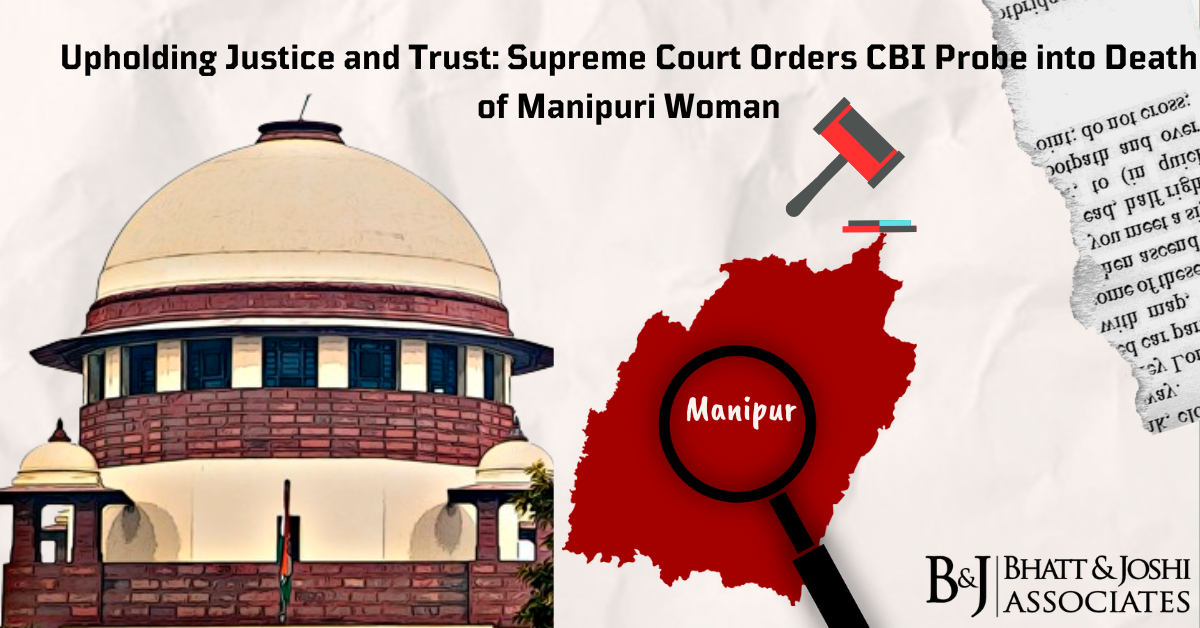Death of Manipuri Woman: Upholding Justice and Trust with Supreme Court’s CBI Probe Order
Introduction: The Supreme Court’s Momentous Decision
The recent ruling by the Supreme Court to order a Central Bureau of Investigation (CBI) probe into the death of a 25-year-old Manipuri woman in Delhi marks a significant development in India’s legal landscape. This decision, which came in response to a plea filed by the deceased’s family, underscores the Court’s commitment to ensuring justice and upholding public trust in institutions. By delving into the details of the case and the Court’s rationale behind its decision, this analysis aims to provide a comprehensive understanding of the legal principles at play and the implications of the ruling.
Exercising Discretion: Supreme Court’s Response to Manipuri Woman Death Case
At the heart of the Supreme Court’s decision lies the exercise of discretion by constitutional courts in transferring investigations to the CBI. While acknowledging the need for caution and restraint in exercising this power, the Court emphasized that it must be wielded in exceptional circumstances to ensure complete justice and protect fundamental rights. In this case, the Court recognized the significance of addressing the family’s concerns and restoring public confidence in the justice system.
Preserving Trust: Addressing Unresolved Crimes in the Death of Manipuri Woman Incident
The Court’s ruling reflects its recognition of the corrosive effect that unresolved crimes can have on public trust in institutions. By ordering a CBI probe into the death of the Manipuri woman, the Court sought to address lingering doubts and suspicions surrounding the investigation conducted by local authorities. This decision underscores the Court’s commitment to transparency, accountability, and the rule of law in addressing serious criminal offences.
Family’s Concerns: Seeking Justice for Death of Manipuri Woman
Central to the Supreme Court’s decision was the plea filed by the deceased’s family, who expressed dissatisfaction with the progress of the investigation conducted by the Delhi Police. The family’s quest for justice and closure propelled the Court to intervene and order a CBI probe into the matter. This highlights the Court’s responsiveness to the grievances of ordinary citizens and its role as a protector of individual rights and liberties.
Questioning the Narrative: Prima Facie Evidence
The Court’s decision to order a CBI probe was influenced by prima facie evidence suggesting foul play in the woman’s death. The presence of blood splattered around the deceased’s body raised doubts about the initial findings of suicide by local authorities. The Court’s decision to question the narrative and seek further investigation underscores its commitment to uncovering the truth and ensuring that justice is served, regardless of the circumstances.
Legal Precedent: Guiding Principles
In justifying its decision, the Supreme Court referred to established legal precedent, including its own judgment in previous cases involving the empowerment of constitutional courts to order CBI investigations. The Court emphasized the need for caution and circumspection in exercising this power, ensuring that it is wielded judiciously and in the interest of justice. By adhering to guiding principles and precedents, the Court reaffirmed its commitment to the rule of law and due process.
Empowering Constitutional Courts: Ensuring Credibility and Accountability
The Supreme Court’s decision to order a CBI probe exemplifies the empowerment of constitutional courts in ensuring the credibility and accountability of investigative agencies. By intervening in cases where there are concerns about the integrity or effectiveness of local investigations, the Court plays a crucial role in upholding the rule of law and safeguarding fundamental rights. This decision underscores the Court’s proactive approach to addressing systemic deficiencies and restoring public trust in the justice system.
Conclusion: Upholding Justice and Trust
In conclusion, the Supreme Court’s ruling to order a CBI probe into the death of the Manipuri woman in Delhi exemplifies its commitment to upholding justice and preserving public trust in institutions. By exercising discretion, responding to the concerns of the deceased’s family, and adhering to legal precedent, the Court reaffirmed its role as a guardian of justice and accountability. This decision sends a powerful message about the Court’s unwavering commitment to fairness, transparency, and the rule of law in India’s democratic framework.










